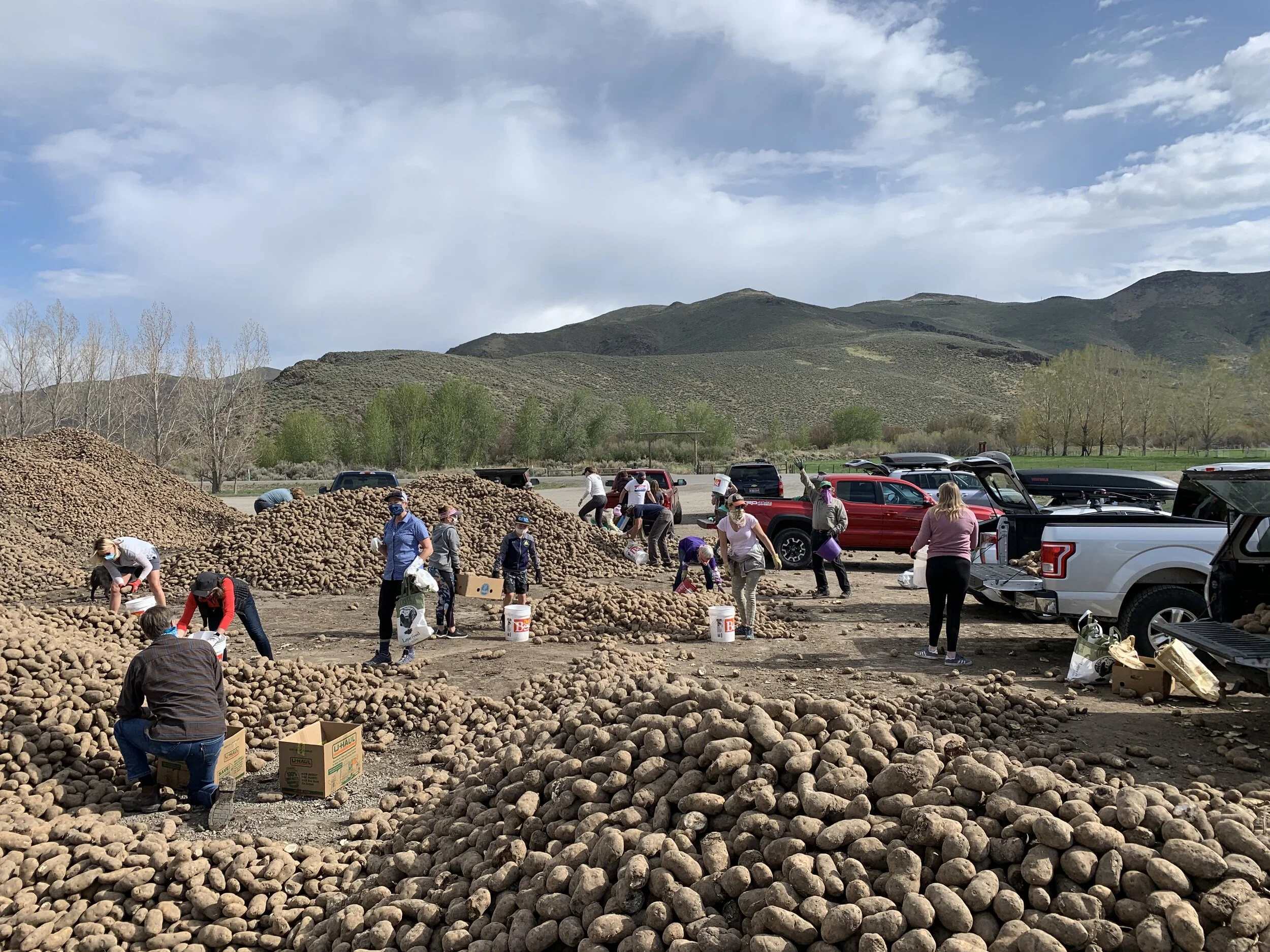By Jessica Sabine Brothers
With agriculture accounting for nearly 17 percent of employment in rural and remote areas, the agricultural industry has taken a major hit due to the disrupted markets and supply chains that resulted from the Coronavirus crisis and shutdown. This month in Hailey, Idaho, community advocate Molly Page was inspired to reconnect a disrupted potato supply chain in her county through a grassroots rescue mission. Molly organized a group of over 50 volunteers to get 40,000 lbs of fresh, local produce in the hands of her community members over the course of two weekends. This grassroots effort has made a huge impact in Blaine County, where half of the area students receive free and reduced lunches. Her efforts have since expanded to neighboring counties of Camas, Gooding and Lincoln.
We were able to follow up with Molly, who is married to Tom Page, an active RVCC participant, to learn more about her community efforts:
RVCC: When you heard about the potatoes being discarded in Blaine County, what led you to reach out to the grower? Did you already have a connection with the farm owner?
Molly: On the first weekend that we organized a ‘potato rescue’, we did not have a connection with the grower. They were simply leaving the potatoes out in big piles for the public to come and get. The grower (and their potatoes) are in Picabo, Idaho. Most of the population in our county is 20 to 45 minutes away from there. Picabo is not on a typical route that people travel in the county, so many people don’t know where it was or how to get there. With our local food bank having distributed as much food in the first month of the pandemic than it did all of last year, I thought we should connect the dots, getting discarded produce to the people who needed it during this time.
Since many people in our county know each other, I was easily able to connect with the grower (Silver Creek Seed - Mark and Jill Johnson) after that first weekend. Now, we are in regular contact when communities want potatoes. Mark and Jill have been gracious and generous with their time and potatoes.
Volunteers loading trucks of potatoes. Photo by Molly Page
RVCC: What actions led to such an engaged community presence in this effort?
Molly: I’ve been doing community organizing in the area for a few years, so people are used to me asking for them to show up and help with things. The network we have built really allowed us to mobilize quickly. I put out a call on social media for volunteers on Friday afternoon, and within 24 hours, we had people showing up and loading potatoes in their trucks to take north to communities in need. Living in a small community also paid off in that I know the mayors and many city council members in the three towns where we dropped potatoes. I had approval from the cities to leave the potato piles within an hour of asking.
RVCC: What are the biggest COVID-19 impacts you’ve seen play out in Hailey? Are there some silver lining activities or grassroots efforts that you’ve seen pop up during this time?
Molly: Blaine County is the home to Sun Valley ski resort. With so many visitors from around the country, we actually had the highest per capita rate of COVID-19 in March. Neighbors, friends and family were all sick. Our county was the first in the state to close everything down on March 15th. We are slowly opening back up, but it has been really damaging to our local economy. Our community was crushed by COVID-19, so everyone is very cautious about getting life back to normal.
If I were to name a silver lining—it’s been great to see our community rally and support each other. From people making and giving away masks to helping deliver for the local CSA to supporting local businesses and nonprofits.
The coronavirus has shown us that there are vulnerabilities in our food system, but the silver lining is that we have a strong local agricultural community that can fill a big gap that has been exposed. Our local CSA has more than tripled their business since the pandemic started. My family has been getting weekly deliveries from them for two years, but we are ordering more produce, milk, eggs and locally-grown and milled flour. My daughter is now making sourdough bread for our neighbors!
RVCC: What’s one thing you’d share with others who are interested in getting more engaged in their community during COVID-19?
Molly: Show up and help when you’re asked! If there isn’t anyone asking and you see something needs to be done, find a few friends and do it! I’ve built incredible friendships in the three years that I’ve done community organizing. It’s been very rewarding.
Delivering potatoes in Dietrich, Idaho. Photo by Molly Page
Molly is a board member of Conservation Voters for Idaho. She enjoys navigating the intersection of politics and conservation. She loves door knocking for candidates and issues in her community.
Molly’s husband Tom has been an active participant and supporter in RVCC. Tom and Molly’s Big Creek Ranch in Idaho consists of a complex mosaic of parcels. Most of their ranch conservation efforts to date have been focused on improving irrigation practices and infrastructure. The ranch is also unique in that all cattle belong to other operators, although the grazing rotations and feeding are performed by Big Creek Ranch staff. To learn more about Big Creek Ranches, visit their website.
You can read more about Molly’s potato rescue efforts in her local MT Express newspaper, as well as national coverage in TIME.


